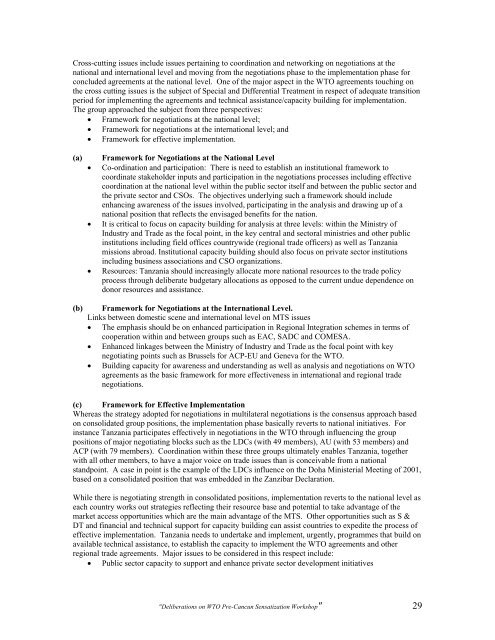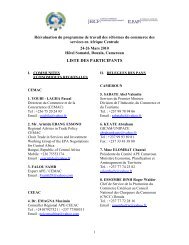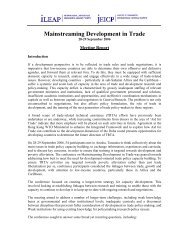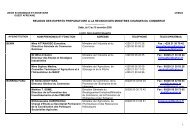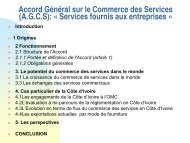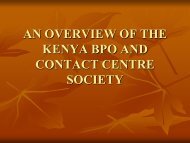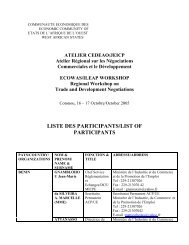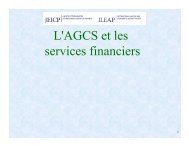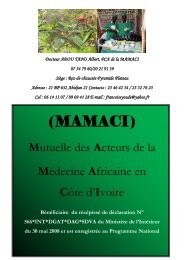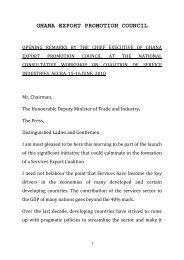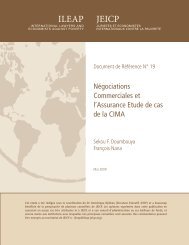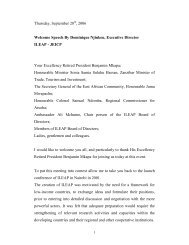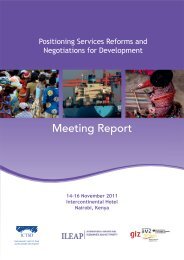Tanzania Report, Dar-Es-Salaam, Tanzania - ILEAP
Tanzania Report, Dar-Es-Salaam, Tanzania - ILEAP
Tanzania Report, Dar-Es-Salaam, Tanzania - ILEAP
You also want an ePaper? Increase the reach of your titles
YUMPU automatically turns print PDFs into web optimized ePapers that Google loves.
Cross-cutting issues include issues pertaining to coordination and networking on negotiations at thenational and international level and moving from the negotiations phase to the implementation phase forconcluded agreements at the national level. One of the major aspect in the WTO agreements touching onthe cross cutting issues is the subject of Special and Differential Treatment in respect of adequate transitionperiod for implementing the agreements and technical assistance/capacity building for implementation.The group approached the subject from three perspectives:• Framework for negotiations at the national level;• Framework for negotiations at the international level; and• Framework for effective implementation.(a)Framework for Negotiations at the National Level• Co-ordination and participation: There is need to establish an institutional framework tocoordinate stakeholder inputs and participation in the negotiations processes including effectivecoordination at the national level within the public sector itself and between the public sector andthe private sector and CSOs. The objectives underlying such a framework should includeenhancing awareness of the issues involved, participating in the analysis and drawing up of anational position that reflects the envisaged benefits for the nation.• It is critical to focus on capacity building for analysis at three levels: within the Ministry ofIndustry and Trade as the focal point, in the key central and sectoral ministries and other publicinstitutions including field offices countrywide (regional trade officers) as well as <strong>Tanzania</strong>missions abroad. Institutional capacity building should also focus on private sector institutionsincluding business associations and CSO organizations.• Resources: <strong>Tanzania</strong> should increasingly allocate more national resources to the trade policyprocess through deliberate budgetary allocations as opposed to the current undue dependence ondonor resources and assistance.(b)Framework for Negotiations at the International Level.Links between domestic scene and international level on MTS issues• The emphasis should be on enhanced participation in Regional Integration schemes in terms ofcooperation within and between groups such as EAC, SADC and COMESA.• Enhanced linkages between the Ministry of Industry and Trade as the focal point with keynegotiating points such as Brussels for ACP-EU and Geneva for the WTO.• Building capacity for awareness and understanding as well as analysis and negotiations on WTOagreements as the basic framework for more effectiveness in international and regional tradenegotiations.(c) Framework for Effective ImplementationWhereas the strategy adopted for negotiations in multilateral negotiations is the consensus approach basedon consolidated group positions, the implementation phase basically reverts to national initiatives. Forinstance <strong>Tanzania</strong> participates effectively in negotiations in the WTO through influencing the grouppositions of major negotiating blocks such as the LDCs (with 49 members), AU (with 53 members) andACP (with 79 members). Coordination within these three groups ultimately enables <strong>Tanzania</strong>, togetherwith all other members, to have a major voice on trade issues than is conceivable from a nationalstandpoint. A case in point is the example of the LDCs influence on the Doha Ministerial Meeting of 2001,based on a consolidated position that was embedded in the Zanzibar Declaration.While there is negotiating strength in consolidated positions, implementation reverts to the national level aseach country works out strategies reflecting their resource base and potential to take advantage of themarket access opportunities which are the main advantage of the MTS. Other opportunities such as S &DT and financial and technical support for capacity building can assist countries to expedite the process ofeffective implementation. <strong>Tanzania</strong> needs to undertake and implement, urgently, programmes that build onavailable technical assistance, to establish the capacity to implement the WTO agreements and otherregional trade agreements. Major issues to be considered in this respect include:• Public sector capacity to support and enhance private sector development initiatives"Deliberations on WTO Pre-Cancun Sensatization Workshop" 29


